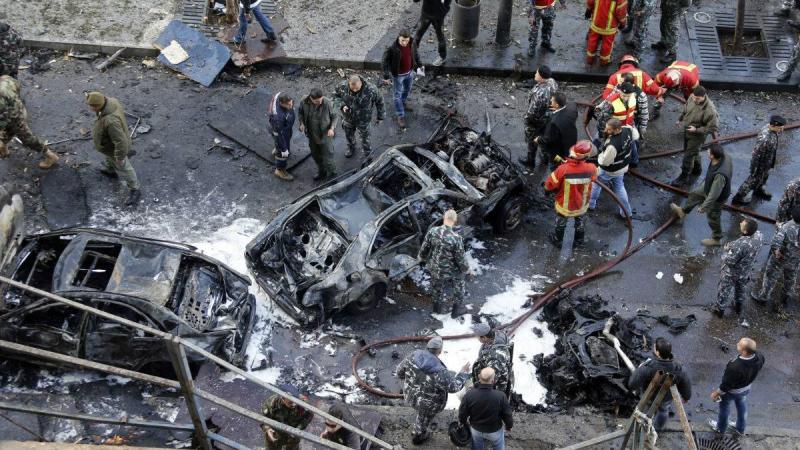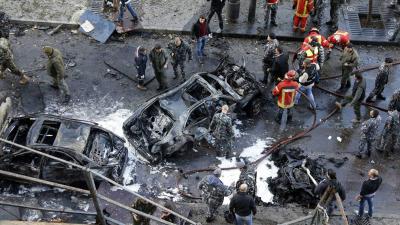The assassination operations carried out by Israel in Lebanon and Palestine using drones have confirmed that various factions, particularly "Hezbollah," are significantly infiltrated.
More than seven months after the confrontations between "Hezbollah" and Israel began, the party appears unable to identify its vulnerabilities that Tel Aviv exploits to assassinate its leaders in their headquarters, homes, and vehicles. Since the onset of this conflict on October 7, 2023, Israel's reliance on security and intelligence warfare stands in stark contrast to the methodology of the 2006 July War, which focused on overwhelming military force and comprehensive destruction of both military and civilian infrastructure.
How can the repeated targeting of "Hezbollah" leaders be explained? These targeted strikes raise questions about the means that enable Israel to hit its targets, whether it is related to its technical capabilities, or security gaps within "Hezbollah" that have led to the exposure of its organizational structure, which remains confidential and known only to a small circle in the party's leadership. Assassination operations have also included field leaders from Palestinian factions who were targeted by drones while heading to border areas to launch attacks against Israel, increasing suspicions regarding the presence of Israeli agents infiltrating these organizations.
In this context, Palestinian factions announced that they had arrested agents following the assassination of "Al-Qassam Brigades" member Hadi Mustafa, having conducted ongoing field monitoring and reconnaissance. They found that two youths, aged around 16 or 17, placed a tracking device in the targeted vehicle. The youths reportedly confessed that an individual had instructed them to place the device, operating it from a location near Tyre, and they were all handed over to Lebanese authorities, although further investigation revealed their innocence regarding the charges against them.
Why did the party fail to identify its intelligence weaknesses? Since the onset of the conflict, "Hezbollah" has accused Syrian workers and displaced individuals who did not leave the South, and later worked to displace many of them, fearing that some may have been recruited by Israel to pinpoint locations and provide coordinates. Most Syrians justified their presence, claiming they earned their livelihood from agriculture and olive harvesting at that time.
According to a Lebanese security source, it is difficult to ascertain whether Israel's success in tracking "Hezbollah" and Palestinian leaders results from technical infiltration or agents within their vicinity or possibly within their ranks. He ruled out the hypothesis of influence by disorganized agents within their ranks, as, in his opinion, the information that facilitates assassination is highly confidential and precise, known only to a select few in the decision-making circle. He noted that targets take protective measures against tracking and do not carry their phones during movements, and they likely obfuscate their movements; nevertheless, they are targeted, which can only be explained by the presence of Israeli agents at a leadership level or technological infiltration that remains unclear and still subject to testing.
Internal Investigations and Complex Technology
According to information, "Hezbollah" has been conducting internal and undeclared investigations for months to verify the absence of infiltrations within its ranks, especially since this information has confused the party internally and made its members wary of one another. However, some close to the party vehemently deny this information, referencing the regional security wars that have also affected leaders of the Iranian Revolutionary Guard in Syria.
Political writer Qassem Qusayr previously revealed that the party is undergoing a comprehensive reassessment regarding battle progress and public interaction, especially within the Shia community, alongside weaknesses it faces, including the assassinations of its leaders. Notably, the party's Secretary-General Hassan Nasrallah denied in one of his appearances the existence of Israeli infiltrations in the military structure, asserting that Israel tracks his party's elements through their phones, urging them to avoid using them.
Assassination of Leaders in the Resistance Axis
Military strategist retired Brigadier General Khalil Halou noted that the assassination of military leaders is a constant goal for warring parties, suggesting that Israel targets field leaders to weaken the military capabilities of the party, "and conversely, if the opportunity allowed, 'Hezbollah' would also target Israeli leaders." In his view, "Israel has managed to determine the targets' locations through prolonged observation, and it is not necessarily due to an internal breach within the party." He added that "Israeli security capabilities are very advanced, encompassing sophisticated electronic tools, drones, reconnaissance aircraft, satellites, and surveillance devices," indicating that Israel sells these technologies to several countries, such as India and Germany, while not dismissing the presence of informants on the ground.
Infiltration of "Hezbollah" and the Factions
Meanwhile, retired Brigadier General Hisham Jaber, head of the Middle East Center for Studies and Public Relations, deemed Israel's resort to assassination operations anticipated following its failure in the Gaza War. He indicated that the assassination process starts with surveilling the target using advanced devices and on-ground agents, asserting that "the infiltration of 'Hezbollah' by agents is not extensive but remains within normal limits." He believes "there are certainly agents, but at the same time, determining the location of anyone has become accessible to all, through phones and specific chips, and identifying and targeting an individual takes no more than half an hour." He clarified that in the 1990s, the former Secretary-General of "Hezbollah," Abbas Al-Moussawi, was assassinated by a military aircraft, but today drones serve this role, offering an easier means to carry out such missions.
Poverty and Unemployment Contributed to Hiring Agents
For his part, the Executive Director of the "Middle East and Gulf Institute for Military and Security Analysis," Riad Qahwaji, pointed out that in wars, armies attempt to strengthen their intelligence capacities within the targeted party. He noted that the ongoing successes in targeting leaders of "Hezbollah" or "Hamas," as well as identifying their movement patterns and weapon storage locations, require sophisticated intelligence work through agents on the ground. In his opinion, "the economic crisis that has engulfed Lebanon, coupled with the spread of poverty and unemployment, has turned some citizens into potential agents due to hardship and deprivation, where there are individuals feeling marginalized and oppressed, seizing any opportunity for financial gain."




